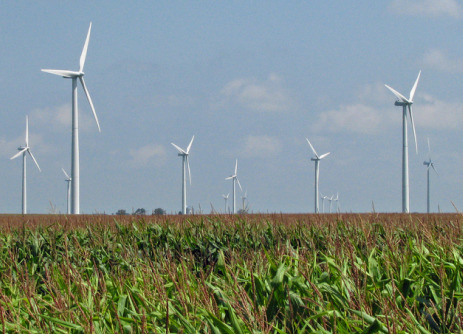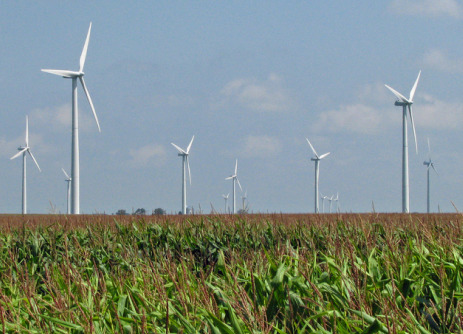 A wind farm in Iowa.Photo courtesy Edith OSB via FlickrGoogle is officially in the green energy business. The search giant announced on Tuesday that its Google Energy subsidiary signed a 20-year power purchase agreement with NextEra Energy. Google will begin buying 114 megawatts of electricity from an Iowa wind farm on July 30.
A wind farm in Iowa.Photo courtesy Edith OSB via FlickrGoogle is officially in the green energy business. The search giant announced on Tuesday that its Google Energy subsidiary signed a 20-year power purchase agreement with NextEra Energy. Google will begin buying 114 megawatts of electricity from an Iowa wind farm on July 30.
Google, of course, cannot directly use the clean green energy generated by the wind farm; that power goes into the local grid. So Google Energy will sell the power on the regional spot market, where utilities and electricity retailers go to buy power when demand spikes and they have a shortfall. Google will use the revenue from spot market sales to buy renewable energy certificates (RECs) which will offset its greenhouse gas emissions.
Many companies buy RECs in an attempt to be carbon neutral, obtaining them from third-party brokers. But by purchasing RECs directly tied to the renewable energy it is also buying, Google is getting a bigger bang for its buck.
“By contracting to purchase so much energy for so long, we’re giving the developer of the wind farm financial certainty to build additional clean energy projects,” Urs Hoelzle, Google’s senior vice president for operations, wrote on a blog post Tuesday.
“The inability of renewable energy developers to obtain financing has been a significant inhibitor to the expansion of renewable energy,” he added. “We’ve been excited about this deal because taking 114 megawatts of wind power off the market for so long means producers have the incentive and means to build more renewable energy capacity for other customers.”
In a statement on its site, Google also noted that its motivations for signing long-term renewable energy contracts are not entirely altruistic.
“Through the long term purchase of renewable energy at a predetermined price, we’re partially protecting ourselves against future increases in power prices,” the company stated. “This is a case where buying green makes business sense.”
It remains to be seen how big a green power purchaser Google will become. (The company has also invested directly in a wind project built by NextEra Energy, the biggest American wind power producer.)
But Dan Reicher, Google.org director of climate change and energy programs, told me earlier this year that finding clean ways of powering Google’s massive data centers led in part to the establishment of Google Energy.
“This interest in procuring green electrons is part of what’s driven Google Energy,” he said.



